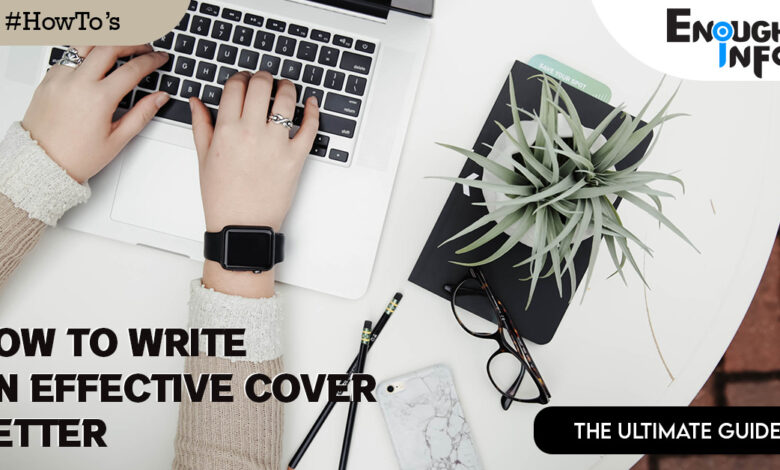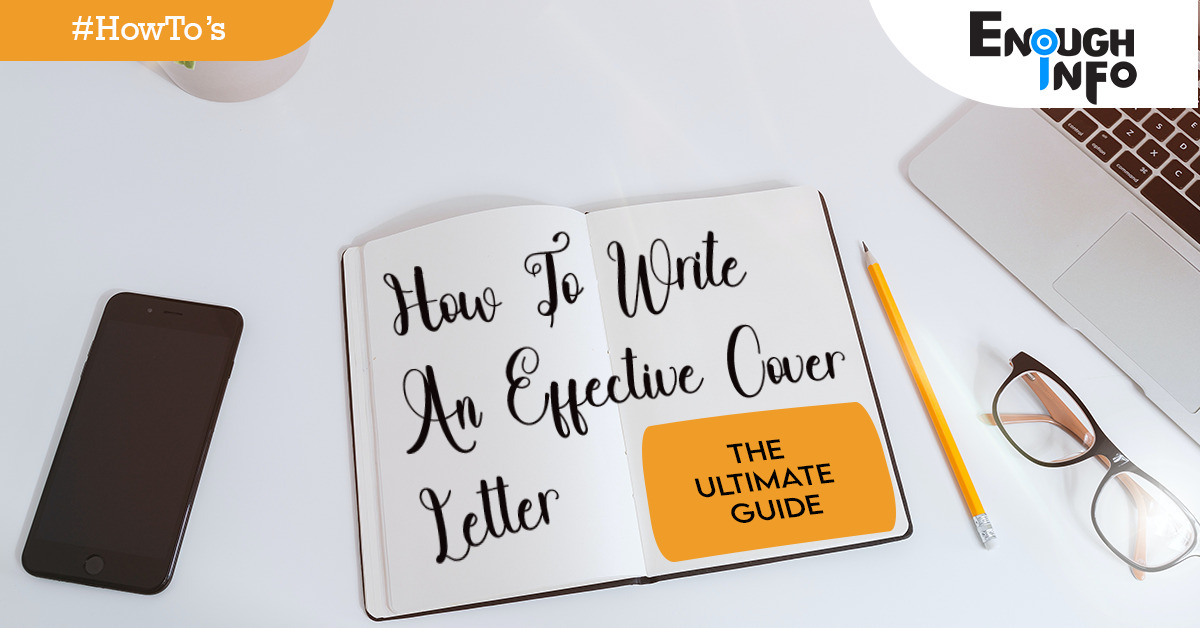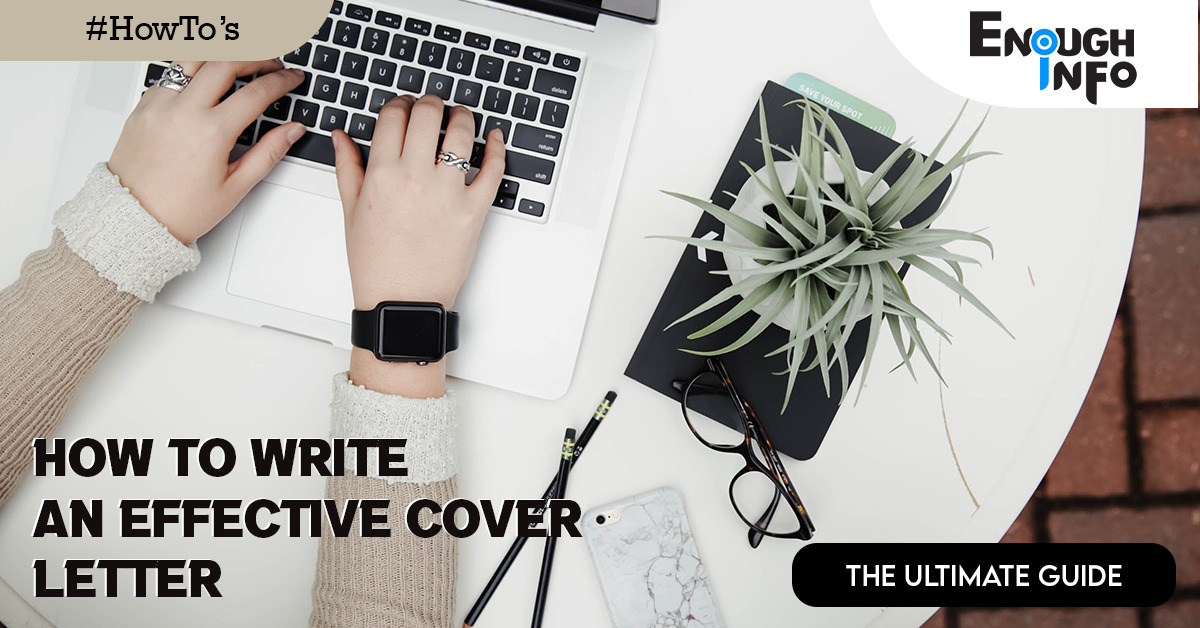
How To Write An Effective Cover Letter: A cover letter is an essential tool in the job application process. It allows you to showcase your skills, experiences, and passion to potential employers, setting the stage for a strong first impression. Submitting a strong cover letter demonstrates your professionalism and attention to detail. It shows that you have taken the time and effort to craft a tailored document that complements your resume and reflects your commitment to the application process. EnoughInfo.com

Writing an effective cover letter is important as it allows you to make a strong first impression, showcase your qualifications, demonstrate enthusiasm, address employer needs, and stand out from the competition. It is a valuable tool in your job search that can significantly impact your chances of securing an interview and ultimately landing the job. How To Get Paint Off Vinyl Floors(The Ultimate Guide)
Read Also: How To Write A Cover Letter For A Job Application
Crafting an Impactful Cover Letter: A Comprehensive Guide to Success
In this comprehensive guide, we will explore the key elements of an effective cover letter, providing you with valuable insights and practical tips to help you craft a compelling document that stands out from the competition. Get ready to learn the art of writing an impactful cover letter.
Understanding the Purpose of a Cover Letter:
- Introduction to Cover Letters: A cover letter is a one-page document that accompanies your resume when applying for a job. It provides an opportunity to introduce yourself, highlight your qualifications, and explain why you are the ideal candidate for the position. How To Dispose of Muriatic Acid(All You Need To Know)
- Importance of a Well-Written Cover Letter: A well-crafted cover letter can significantly increase your chances of getting noticed by employers. It allows you to express your enthusiasm, demonstrate your fit for the role, and showcase your unique qualities that set you apart from other applicants.
Research and Preparation:
- Targeting the Employer: Before writing your cover letter, conduct thorough research on the company. Familiarize yourself with their mission, values, and recent achievements. This knowledge will enable you to tailor your cover letter to their specific needs and showcase your alignment with their goals.
- Understanding the Job Description: Carefully analyze the job description and make note of the key skills, qualifications, and experiences required for the role. This understanding will guide you in highlighting the most relevant aspects of your background in your cover letter.
- Identifying Key Skills and Experiences: Evaluate your own skills, experiences, and achievements that directly relate to the job requirements. Identify specific examples that demonstrate your capabilities and how they align with the company’s needs.
Formatting and Structure:
- Contact Information and Header: Include your contact information at the top of the cover letter, including your full name, phone number, email address, and LinkedIn profile (if applicable). Follow this with the current date and the employer’s contact details.
- Salutation and Opening Paragraph: Address the recipient by name whenever possible. If you are unsure of the contact person, use a professional greeting such as “Dear Hiring Manager.” In the opening paragraph, clearly state the position you are applying for and express your interest and enthusiasm for the role.
- Body Paragraphs: The body of your cover letter should consist of two to three paragraphs. Use this space to showcase your skills, experiences, and achievements that directly relate to the job requirements. Each paragraph should focus on a specific aspect and provide examples to support your claims.
- Closing Paragraph and Signature: In the closing paragraph, reiterate your interest in the position and summarize why you are an excellent fit. Include a strong call to action, expressing your desire for an interview and your willingness to provide further information. End the letter with a professional closing and your typed name. How To Tell If A Libra Man Is Playing You
Read Also: How To Write A Literary Analysis( All You Need to Know)
Crafting the Content:
The content of your cover letter is crucial in conveying your qualifications, experiences, and enthusiasm for the position. Here are some key considerations to keep in mind when crafting the content of your cover letter:
Opening Paragraph: Captivating the Reader
The opening paragraph of your cover letter should immediately capture the reader’s attention and make them eager to continue reading. Consider the following elements:
- Express genuine enthusiasm for the position and the company.
- Mention how you learned about the job opportunity (e.g., job board, referral, company website).
- If applicable, highlight any previous encounters with the company or any mutual connections that piqued your interest. FUTMINNA 2023 Post-UTME/DE Form: Minimum Score and Requirements
Example: “Dear Hiring Manager, I am thrilled to submit my application for the [Position] at [Company]. As a longtime admirer of your innovative products and dedication to customer satisfaction, I was excited to discover the opening through a trusted colleague who spoke highly of your company’s culture and commitment to excellence.”
Body Paragraphs: Showcasing Your Skills and Experiences
The body paragraphs of your cover letter provide an opportunity to demonstrate your qualifications and experiences that directly align with the job requirements. Consider the following tips:
- Choose two to three key skills or experiences that are most relevant to the position and expand on them.
- Use specific examples to illustrate your achievements and how they demonstrate your capabilities.
- Highlight how your skills and experiences directly address the needs of the company and contribute to their goals. China Heavily Regulates Generative AI Services Like ChatGPT
Example: “In my previous role as a Marketing Coordinator at XYZ Company, I developed and executed comprehensive digital marketing campaigns that resulted in a 30% increase in website traffic and a 20% growth in online sales within six months. Through my strong analytical skills, I conducted market research, identified target audiences, and optimized social media strategies, which significantly expanded our brand reach and engagement. I believe that my expertise in data-driven marketing and my ability to develop impactful campaigns would make a valuable contribution to [Company’s] ongoing growth.”
Read Also: How to Improve Your Spoken English (25 Sure Tips)
Closing Paragraph: Strong Call to Action
The closing paragraph of your cover letter should leave a lasting impression and prompt the reader to take action. Consider the following elements:
- Express your continued interest in the position and highlight your enthusiasm for the opportunity to contribute to the company.
- Reiterate your qualifications and the value you can bring to the role.
- Provide a clear call to action, expressing your desire for an interview and your willingness to provide further information. Scientists Are Cultivating Seeds In Space To Adapt To Climate Change
Example: “Thank you for considering my application for the [Position] at [Company]. I am excited about the possibility of joining your team and contributing to the continued success of [Company]. If given the chance, I’d be happy to elaborate on my experience and talents and show you how they mesh with your requirements. I am available at your convenience for an interview, and I look forward to the possibility of discussing how I can contribute to the future growth and success of [Company].”
Remember to keep the content of your cover letter concise, focused, and engaging. Use clear and professional language, avoiding jargon or overly technical terms. Each paragraph should build upon the previous one, creating a cohesive narrative that showcases your qualifications and demonstrates your enthusiasm for the position. Proofread your cover letter carefully to ensure it is error-free and conveys your message effectively.
Body Paragraphs:
- Showcasing Your Skills and Experiences: In the body paragraphs, focus on specific skills, experiences, and accomplishments that directly relate to the job requirements. Use concrete examples to demonstrate your expertise and how you have successfully contributed in similar roles.
- Closing Paragraph: Strong Call to Action: The closing paragraph is your chance to summarize your key qualifications and express your enthusiasm for the opportunity to interview. Reiterate your interest in the position, provide your contact information, and express gratitude for the reader’s consideration.
Language and Tone:
Professional and Engaging Language: Use professional language throughout your cover letter. Be concise, clear, and avoid using jargon or overly technical terms. Maintain a positive and enthusiastic tone, showcasing your passion for the field and the specific role.
Avoiding Common Mistakes: Proofread your cover letter carefully to avoid grammatical and spelling errors. Use proper punctuation and sentence structure. Avoid repeating information from your resume and focus on providing new insights into your qualifications.
Tailoring the Tone to the Company Culture: Tailor your language and tone to align with the company’s culture and values. Research the company’s communication style, and try to match it in your cover letter. For example, if the company has a casual and friendly culture, you can adopt a slightly more conversational tone.

Showcasing Your Value:
Highlighting Relevant Skills and Accomplishments: Emphasize the skills and accomplishments that directly relate to the job requirements. Use concise and specific language to highlight your contributions and achievements in previous roles. How To Have A Successful Relationship With A Mama’s Boy
Making Connections to the Job Requirements: Demonstrate how your skills and experiences align with the job requirements mentioned in the job description. Make clear connections between your qualifications and the needs of the company.
Using Metrics and Data to Support Claims: Whenever possible, quantify your achievements using metrics or data. For example, mention the percentage increase in sales you achieved or the number of clients you successfully managed. This helps to substantiate your claims and adds credibility to your application.
Read Also: How to write a thank-you letter
Personalization and Customization:
- Tailoring the Cover Letter to the Job and Company: Customize your cover letter for each job application to demonstrate your genuine interest in the specific position and company. Incorporate keywords and phrases from the job description to show that you understand the requirements and have the relevant skills.
- Researching and Incorporating Company Culture: Take the time to research the company’s culture, values, and mission. Incorporate this knowledge into your cover letter to showcase your alignment with their organizational ethos. Highlight any specific projects, initiatives, or values of the company that resonate with you. How To Make A DIY Face Mask For Dry Skin
- Addressing Potential Concerns or Gaps: If you have any potential concerns or gaps in your resume, address them in a positive and proactive manner. Explain how you have worked to overcome challenges or how your transferable skills make you a strong candidate despite any gaps in your experience.
Proofreading and Editing:
- Checking for Grammar and Spelling Errors: Thoroughly proofread your cover letter to eliminate any grammar or spelling errors. Pay close attention to punctuation, sentence structure, and word choice. Read the cover letter aloud or ask someone else to review it for clarity and flow.
- Reviewing the Content for Clarity and Coherence: Ensure that the content of your cover letter is clear, concise, and coherent. Remove any unnecessary information and ensure that your main points are effectively communicated. Use paragraphs and transitions to organize your thoughts logically.
- Seeking Feedback from Others: Consider seeking feedback from a trusted friend, mentor, or career advisor. They can provide valuable insights and suggestions for improvement. Fresh eyes may catch errors or provide suggestions for enhancing the overall impact of your cover letter.
Additional Tips and Considerations:
- Keeping the Cover Letter Concise and Focused: Limit your cover letter to one page and keep the content focused and relevant. Avoid repeating information from your resume or going into excessive detail. Maintain a balance between providing sufficient information and keeping the letter concise and engaging.
- Using an Appropriate and Professional Format: Choose a professional font and format for your cover letter. Use a consistent font style and size throughout the document. Ensure that the overall layout is visually appealing and easy to read. Consider using bullet points or headings to enhance readability.
- Following Instructions and Submission Guidelines: Pay close attention to any specific instructions or submission guidelines provided by the employer. Adhere to the requested format, submission method, and any specific requirements mentioned in the job posting. Failure to follow instructions may lead to your application being disregarded.
Read Also: How To Write A Proposal(Steps and Requirements)
FAQs & Answers
1. How long should a cover letter be?
A cover letter should typically be one page in length. It’s important to be concise and focused, highlighting the most relevant qualifications and experiences.
2. Should I include personal information in a cover letter?
While it’s important to provide your contact information at the top of the cover letter, avoid including personal details such as your marital status, age, or hobbies unless they are directly relevant to the job.
3. Is it necessary to address the hiring manager by name?
Whenever possible, addressing the hiring manager by name adds a personal touch to the cover letter. However, if the name is not provided in the job posting or is not easily accessible, a professional greeting like “Dear Hiring Manager” is acceptable.
4. How should I address potential employment gaps in my cover letter?
If you have employment gaps or other potential concerns, address them proactively and positively in your cover letter. Explain any steps you took during that time to enhance your skills, pursue professional development, or engage in relevant activities.
5. Can I mention salary expectations in a cover letter?
It’s generally recommended to avoid discussing salary expectations in a cover letter unless specifically requested by the employer. The focus should be on showcasing your qualifications and fit for the position.
6. Should I send a cover letter as an attachment or in the body of an email?
A: It’s best to follow the application instructions provided by the employer. If they specify sending a cover letter as an attachment, do so. If not specified, you can either attach the cover letter as a separate document or include it in the body of the email.
7. How should I end a cover letter?
End your cover letter with a professional closing, such as “Sincerely” or “Best regards,” followed by your typed name. If you’re sending a digital copy, you can include a scanned or typed signature below your name.
Conclusion
Crafting an effective cover letter is a skill that can significantly enhance your job application success. By understanding the purpose of a cover letter, conducting thorough research, following a well-structured format, and tailoring your content, you can create a compelling document that highlights your qualifications and sets you apart from other applicants. Remember to proofread, seek feedback, and showcase your unique value. With practice and attention to detail, you can master the art of writing an impactful cover letter and increase your chances of landing your desired job.
Recommended;
How To Write A Report(Steps and Requirements)
What Money Market Account Is And How It Works
Common Types Of Cyber Attacks And How To Protect Your Personal Data




